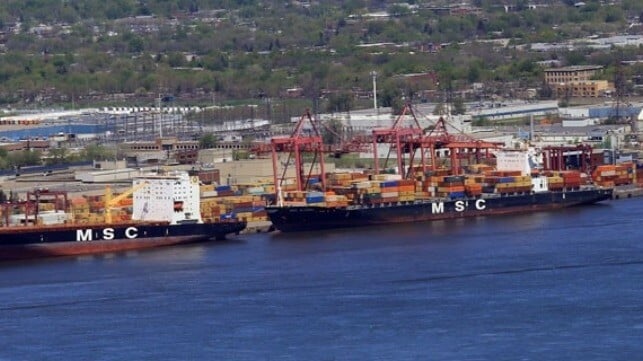Montreal Dockworkers Schedule Strike Against Terminal Operator for MSC

Dockworkers in Montreal, Canada filed notice of their intent to go on strike starting Thursday, October 31, against two of the primary container terminals as part of their long-running contract dispute. CUPE Local 375 is pressuring the Maritime Employers Association into an agreement saying this would be an unlimited strike but offering to withdraw the notice if an agreement could be reached on the work schedule portion of the dispute.
The local of the Canadian Union of Public Employees has been without a contract for all of 2024 while the dispute over work schedule issues dates back to prior contracts. Union officials however are accusing Termont, operator of the Maisonneuve and Viau terminals, of “provoking longshore workers and their local by using schedules that have negative impacts on work-life balance.” They contend the company modified work schedules “in a punitive way.”
Due to start Thursday morning and continue indefinitely, the strike would impact the two terminals which handle 40 percent of the port’s container traffic and 15 percent of the overall volume handled at the Port of Montreal. Termont highlights that it handles over 500,000 containers annually and has a long-term contract for handling the business of Mediterranean Shipping Company at the Port of Montreal.
The union has indicated it would withdraw the strike notice if an agreement could be reached on the work rules. Leaders told the media that they were confident the wage portion of the dispute could be easily resolved. They said Montreal longshore members were willing to accept a 20 percent increase over four years, which is the same terms given to longshore workers in the ports of Halifax and Vancouver.
The planned strike comes after the union shut down the Port of Montreal on Sunday with a 24-hour strike and since October 10 has been refusing all overtime assignments. Last month, the union also held a three-day strike against Termont.
The Canadian Federation of Independent Business (CFIB), Canada’s largest association of small and medium-sized businesses, issued a strongly-worded statement on Sunday condemning the union. They are calling for intervention by the federal government, which had offered to establish a special mediator. The offer failed to gain support and was withdrawn by the government, which so far has not taken further actions to end the dispute.
“The only reason the longshoremen are striking is because they can. They have no remorse for the economic harm and uncertainty their actions are causing. Canada's SMEs are once again the collateral damage of the union's irresponsible actions,” said Jasmin Guenette, Vice-President, National Affairs, CFIB, contending that “labor laws are so heavily weighted in favor of the big unions. It's time the federal government made ports an essential service, so that they remain operational at all times. This will protect our supply chain and our SMEs and will make labor actions like we are seeing at the Port of Montreal impossible.”

that matters most
Get the latest maritime news delivered to your inbox daily.
Similar anger emerged last year when Canada’s West Coast ports were disrupted by a contract dispute with the longshoremen’s union. The federal government helped to resolve that dispute and promised an investigation.
The latest West Coast dispute, which involves the contract for 700 foremen has also been contentious with the Canada Industrial Relations Board ruling last week that the union had negotiated in bad faith. With the current West Coast strike authorization due to expire on November 2, the International Longshore and Warehouse Union Local 514 and the British Columbia Maritime Employers Association agreed with federal mediators to resume contract negotiations starting today, October 29. Previous efforts by the union to conduct a strike at DP World’s facilities were blocked by the labor regulators.
